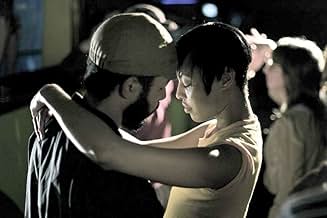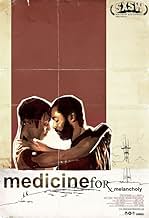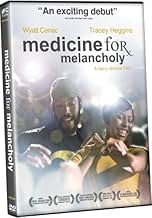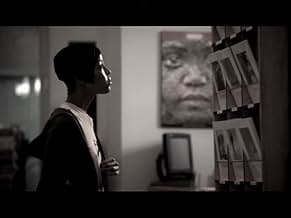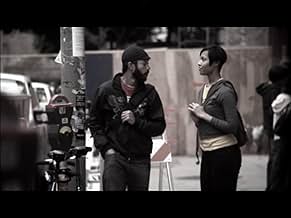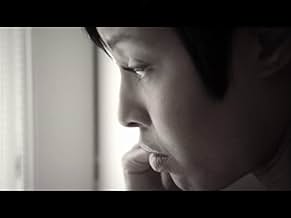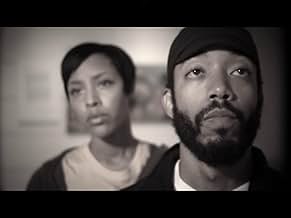IMDb RATING
6.6/10
2.8K
YOUR RATING
Twenty-four hours in the tentative relationship of two young San Franciscans also dealing with the conundrum of being a minority in a rapidly gentrifying city.Twenty-four hours in the tentative relationship of two young San Franciscans also dealing with the conundrum of being a minority in a rapidly gentrifying city.Twenty-four hours in the tentative relationship of two young San Franciscans also dealing with the conundrum of being a minority in a rapidly gentrifying city.
- Awards
- 2 wins & 10 nominations total
Melissa Bisagni
- Sierra Orneilias
- (as Melisa Bisagni)
Chida Emeka
- Hydration Hustler 1
- (as Chidi Emeka)
Ondine Kilker
- Ondine Kilcher - Housing Rights Meeting Attendee
- (as Ondine Kilcher)
- Director
- Writer
- All cast & crew
- Production, box office & more at IMDbPro
Featured reviews
Medicine for Melancholy finds Barry Jenkins in his first feature as writer and director grasping for nothing. I can believe he was working from a script, though the feel and approach is closer to the style by the Duplass brothers and Andrew Bujalski and Joe Swanberg and those loose-as-whatever cats ("Mumblecore" to the critical laymans). What develops here is too little, and as a basic character portrait it falters because the two leads have zero chemistry.
More than that, Wyatt Cenac is both miscast and misdirected; I can believe that he can be funny (at least in a deadpan approach and playing off of someone who can match him) since he was on the Daily Show and other comedy ventures I'd liked, but as the lead in what is ALL about behavior and character and is deep down a drama, he brings less than nothing in this tiny sliver of a slice of life about a guy who tries to connect with a woman he had a one-night stand with (and that she cheated on her boyfriend, who happens to be white, though we never see him, God forbid Jenkins allow some added conflict or emotions to rise)
The two leads need to have enough charisma or chemistry or ANYTHING to keep us engaged, but they're given little by Jenkins (Cenac picks up a a guitar at one point, that's about it, the rest of the time he is either indifferent to Jo, played by Tracey Higgins), and they don't spark at all off of one another. Compared to them, Anakin and Padme are Michael Douglass and Glenn Close in the first act of Fatal Attraction. And it's not that they need to show full on sexual chemistry or anything like that (there is a sex scene but it's shot in all close- ups and done in a tasteful way, which is fine), but something needs to be there, whether it's dialog that can carry them to a place where we understand what draws them together or mutual interests and so on.
We don't get to know much about these two people, aside from the fact that Micah is obsessed with how black people are portrayed in society and are seen in that way (in the moment of the film where things finally come to some climax as she calls him out on it this is a primary issue), and that Jo likes, uh, art, and thinks Bowie and Queen's Under Pressure is better than Ice, Ice, Baby because it's Bowie and Queen (Micah thinks the beat is used better by Vanilla Ice, nevermind that a white guy is using a beat for a lame rap song and the cultural appropriation baggage there). Even in the brief dip into a pop culture talk, the moment where we might see this man and woman not unlike we might be as couples or trying to get to know people, it's awkward and stilted.
So what Jenkins gives his audience is a lot of these characters walking around, talking here and there, having a moment of sex, and mostly her telling him to do things (take a shower, get something to eat, go dance), and then the realization that (gasp) they have nothing in common. There's no insight, no enjoyment being with this couple, regardless of if the futilism Micah's doing is meant to be interesting in and of itself (this is post a break-up I think, it's unclear though, thanks MySpace reference).
When a filmmaker announces him or herself as a major force in modern cinema with one film it's kind of a big deal, and not unlike Damien Chazelle did with Whiplash and then his follow-up La La Land, it's staggering to consider the quantum leap he had from Guy and Madeline on a Park Bench, and the same can be said here for Jenkins from 'Melancholy' to Moonlight. At least Chazelle had the musical sense already down even if the narrative was sloppy; here, it's like a character exercise that was stretched for far too long, and Jenkins and DP James Laxton (who also shot in brilliant strokes Moonlight) give this a look that should be black and white but seems to be more washed-out, like all of the color has been washed and left to dry on a clothes hanger in the backyard. Though Laxton gets some interesting shots, it's unpleasant to look at, and it makes it a tough sit due to the fact that the characters are unpleasant, or at least the reason they stick together is unpleasant.
One full star goes to the use of Tom Waits' 'Lie to Me.'
More than that, Wyatt Cenac is both miscast and misdirected; I can believe that he can be funny (at least in a deadpan approach and playing off of someone who can match him) since he was on the Daily Show and other comedy ventures I'd liked, but as the lead in what is ALL about behavior and character and is deep down a drama, he brings less than nothing in this tiny sliver of a slice of life about a guy who tries to connect with a woman he had a one-night stand with (and that she cheated on her boyfriend, who happens to be white, though we never see him, God forbid Jenkins allow some added conflict or emotions to rise)
The two leads need to have enough charisma or chemistry or ANYTHING to keep us engaged, but they're given little by Jenkins (Cenac picks up a a guitar at one point, that's about it, the rest of the time he is either indifferent to Jo, played by Tracey Higgins), and they don't spark at all off of one another. Compared to them, Anakin and Padme are Michael Douglass and Glenn Close in the first act of Fatal Attraction. And it's not that they need to show full on sexual chemistry or anything like that (there is a sex scene but it's shot in all close- ups and done in a tasteful way, which is fine), but something needs to be there, whether it's dialog that can carry them to a place where we understand what draws them together or mutual interests and so on.
We don't get to know much about these two people, aside from the fact that Micah is obsessed with how black people are portrayed in society and are seen in that way (in the moment of the film where things finally come to some climax as she calls him out on it this is a primary issue), and that Jo likes, uh, art, and thinks Bowie and Queen's Under Pressure is better than Ice, Ice, Baby because it's Bowie and Queen (Micah thinks the beat is used better by Vanilla Ice, nevermind that a white guy is using a beat for a lame rap song and the cultural appropriation baggage there). Even in the brief dip into a pop culture talk, the moment where we might see this man and woman not unlike we might be as couples or trying to get to know people, it's awkward and stilted.
So what Jenkins gives his audience is a lot of these characters walking around, talking here and there, having a moment of sex, and mostly her telling him to do things (take a shower, get something to eat, go dance), and then the realization that (gasp) they have nothing in common. There's no insight, no enjoyment being with this couple, regardless of if the futilism Micah's doing is meant to be interesting in and of itself (this is post a break-up I think, it's unclear though, thanks MySpace reference).
When a filmmaker announces him or herself as a major force in modern cinema with one film it's kind of a big deal, and not unlike Damien Chazelle did with Whiplash and then his follow-up La La Land, it's staggering to consider the quantum leap he had from Guy and Madeline on a Park Bench, and the same can be said here for Jenkins from 'Melancholy' to Moonlight. At least Chazelle had the musical sense already down even if the narrative was sloppy; here, it's like a character exercise that was stretched for far too long, and Jenkins and DP James Laxton (who also shot in brilliant strokes Moonlight) give this a look that should be black and white but seems to be more washed-out, like all of the color has been washed and left to dry on a clothes hanger in the backyard. Though Laxton gets some interesting shots, it's unpleasant to look at, and it makes it a tough sit due to the fact that the characters are unpleasant, or at least the reason they stick together is unpleasant.
One full star goes to the use of Tom Waits' 'Lie to Me.'
Twenty-four hours in the tentative relationship of two young San Franciscans also dealing with the conundrum of being a minority in a rapidly gentrifying city.
Barry Jenkins has described the film's two main characters as "playing out a debate back and forth about identity politics". Each of the two main characters embodies an ideology. Jenkins saw the character of Micah as a man who was always building barriers, whereas Jo thinks that race is a limiter. Accusing Jo of assimilation, Micah strives to reclaim his essential "blackness" as Jo contrastingly claims Micah has a "hang up" about his race and strives to overcome her own.
Roger Ebert gave the film 3.5 out of 4 stars, calling the actors "effortlessly engaging" and the direction "assured"; he also noted the film was "beautifully photographed". Ebert is right on all counts. The acting is superb, very natural, and really shows off Wyatt Cenac as more than a comedian. The direction is strong, and the cinematography is gorgeous, some of the best you will find anywhere, whether in a big budget film or indie.
The discussion of race is great. As a white man, maybe I can't see the issue from the point of view of Micah, Jo or Barry Jenkins. But I love that there's this divide of ideas. Micah is indignant, as he should be, about being a minority. But Jo prefers to look forward. Indeed, how does one define themselves? I don't think of myself as "white", and sometimes not even as a "man", but do these things define me whether or not I choose to accept them?
Barry Jenkins has described the film's two main characters as "playing out a debate back and forth about identity politics". Each of the two main characters embodies an ideology. Jenkins saw the character of Micah as a man who was always building barriers, whereas Jo thinks that race is a limiter. Accusing Jo of assimilation, Micah strives to reclaim his essential "blackness" as Jo contrastingly claims Micah has a "hang up" about his race and strives to overcome her own.
Roger Ebert gave the film 3.5 out of 4 stars, calling the actors "effortlessly engaging" and the direction "assured"; he also noted the film was "beautifully photographed". Ebert is right on all counts. The acting is superb, very natural, and really shows off Wyatt Cenac as more than a comedian. The direction is strong, and the cinematography is gorgeous, some of the best you will find anywhere, whether in a big budget film or indie.
The discussion of race is great. As a white man, maybe I can't see the issue from the point of view of Micah, Jo or Barry Jenkins. But I love that there's this divide of ideas. Micah is indignant, as he should be, about being a minority. But Jo prefers to look forward. Indeed, how does one define themselves? I don't think of myself as "white", and sometimes not even as a "man", but do these things define me whether or not I choose to accept them?
First, a comment to the two reviewers who found this film 'slow,' etc;
The pace of films - for MOST of the 20th century were at a much slower pace. It lets the director get to know the characters, etc.
In today's film market - in which a HUGE part of the pie is overseas sales/distribution - dialogue doesn't translate, but, ACTIONS do.
That's one of the reasons why most films of the past decade or so, have interchangeable plots, characters - the story is second to the action.
Saying that, let me talk about MEDICINE FOR MELANCHOLY.
I came in a few minutes after it had begun. I'd never seen, nor heard of it (my friend had left the TV on, and was actually watching something prior - FLAWLESS, with R. DeNiro.
I came in when Micah was in a cab bringing the lost wallet he'd found back to it's owner, Jo (I know that they'd had casual sex just before this, and didn't know each other).
I got caught up in the dialogue. It was slow. It as natural, as to how two people meet (awkwardly) at inopportune times.
I quickly picked up on the ambivalence Jo' was having, and Micah, just trying (at first) to get to know Jo a bit.
The film follows them throughout that day - and that night, as the two start to reveal more of themselves. A third important cast member, who's very important, is the sprawling city of San Francisco.
I love the cinematography done on this film. It's a loving portrayal of San Francisco.
The pair walk through streets, and neighbourhoods, that are far from the shiny images tourists see, or think of, when they hear the city's name.
As for the performances of both the two (verbal) actors, I enjoyed their charisma, and I hope to see more from them in the future.
MEDICINE FOR MELANCHOLY is not for people who are impatient, or 'don't get' plots. But, for those who enjoy spending an afternoon, and just letting a film wash over you, this one's definitely one to watch.
The pace of films - for MOST of the 20th century were at a much slower pace. It lets the director get to know the characters, etc.
In today's film market - in which a HUGE part of the pie is overseas sales/distribution - dialogue doesn't translate, but, ACTIONS do.
That's one of the reasons why most films of the past decade or so, have interchangeable plots, characters - the story is second to the action.
Saying that, let me talk about MEDICINE FOR MELANCHOLY.
I came in a few minutes after it had begun. I'd never seen, nor heard of it (my friend had left the TV on, and was actually watching something prior - FLAWLESS, with R. DeNiro.
I came in when Micah was in a cab bringing the lost wallet he'd found back to it's owner, Jo (I know that they'd had casual sex just before this, and didn't know each other).
I got caught up in the dialogue. It was slow. It as natural, as to how two people meet (awkwardly) at inopportune times.
I quickly picked up on the ambivalence Jo' was having, and Micah, just trying (at first) to get to know Jo a bit.
The film follows them throughout that day - and that night, as the two start to reveal more of themselves. A third important cast member, who's very important, is the sprawling city of San Francisco.
I love the cinematography done on this film. It's a loving portrayal of San Francisco.
The pair walk through streets, and neighbourhoods, that are far from the shiny images tourists see, or think of, when they hear the city's name.
As for the performances of both the two (verbal) actors, I enjoyed their charisma, and I hope to see more from them in the future.
MEDICINE FOR MELANCHOLY is not for people who are impatient, or 'don't get' plots. But, for those who enjoy spending an afternoon, and just letting a film wash over you, this one's definitely one to watch.
It was lucky that I had a computer nearby so that I could read email while watching this movie. There is a kind of quirky genius to it and I did feel an intimate connection to the characters at times. It felt real and familiar, a little bit awkward to be seeing them so close and personal. In a way the extreme realness of the film was its downfall. Hitchcock once said something to the effect that films are like real life with the boring parts taken out. Too many of the boring parts were left in this film.
The cinematography is weak, but the use of muted colors matches the plodding dullness of the film, which may have been the intention. The music was a strong point, I thought -- it was different and original, fresh and creative.
The cinematography is weak, but the use of muted colors matches the plodding dullness of the film, which may have been the intention. The music was a strong point, I thought -- it was different and original, fresh and creative.
10matty03
I wasn't sure what to expect when I sat down to view this film. I knew it had been filmed here in San Francisco and had won some praise. And, I knew it was low-budget/indie.
However, nothing prepared me for the beauty and quiet power of this film. Aside from the painfully beautiful and realistic performances of the two actors and the story of a stretched out one night stand is something that more than a few of us can relate to/with --- what really makes this film stand out for me is the artistic use of editing and cinematography.
The director has created a sharp and tightly made film. Not in color and not in black and white -- the film really sparkles by use of some form of muted visual effect that works on multiple levels considering the story, emotions, actions and lives of the two characters. The editing is perfect -- creating a pace which is both natural and urgent all at once.
I found this film to be close to perfect and elegant.
I suspect we will see a number of indie filmmakers attempt to copy the style of this film.
How refreshing to see a truly original film which never falls back on cliché or indie film tricks.
I also found the use of San Francisco to be quite clever. The city acts as not only a sort of symbol for various aspects of the characters and their relationship but almost as a third character hovering in every single scene.
This is movie not to be missed!
However, nothing prepared me for the beauty and quiet power of this film. Aside from the painfully beautiful and realistic performances of the two actors and the story of a stretched out one night stand is something that more than a few of us can relate to/with --- what really makes this film stand out for me is the artistic use of editing and cinematography.
The director has created a sharp and tightly made film. Not in color and not in black and white -- the film really sparkles by use of some form of muted visual effect that works on multiple levels considering the story, emotions, actions and lives of the two characters. The editing is perfect -- creating a pace which is both natural and urgent all at once.
I found this film to be close to perfect and elegant.
I suspect we will see a number of indie filmmakers attempt to copy the style of this film.
How refreshing to see a truly original film which never falls back on cliché or indie film tricks.
I also found the use of San Francisco to be quite clever. The city acts as not only a sort of symbol for various aspects of the characters and their relationship but almost as a third character hovering in every single scene.
This is movie not to be missed!
Did you know
- TriviaMade on a budget of $13,000.
- Crazy creditsEach song in the soundtrack appears in the credits with a still frame from the part of the movie where it was used.
- How long is Medicine for Melancholy?Powered by Alexa
Details
- Release date
- Country of origin
- Official site
- Language
- Also known as
- Melankolinin İlacı
- Filming locations
- Production companies
- See more company credits at IMDbPro
Box office
- Budget
- $13,000 (estimated)
- Gross US & Canada
- $111,551
- Opening weekend US & Canada
- $12,625
- Feb 1, 2009
- Gross worldwide
- $111,551
- Runtime1 hour 28 minutes
- Color
- Aspect ratio
- 1.78 : 1
Contribute to this page
Suggest an edit or add missing content

Top Gap
By what name was Medicine for Melancholy (2008) officially released in India in English?
Answer




